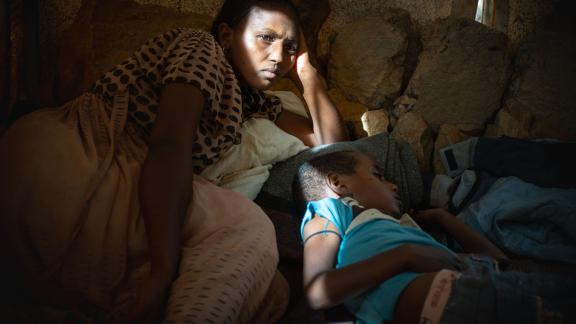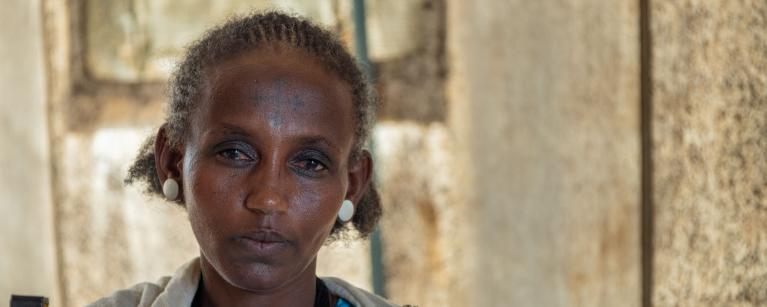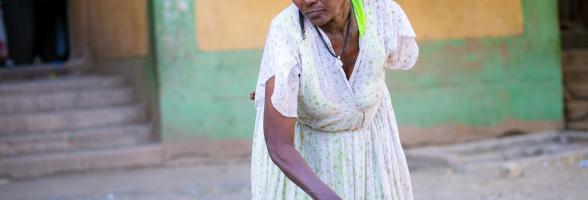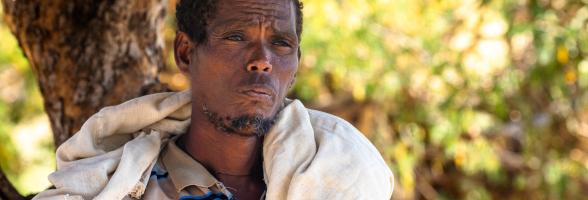In Abi-Adi town, a community of people displaced by conflict in northern Ethiopia’s Tigray Region, a woman in a clean blue dress stood out in the crowd as she headed toward the well pump. The 48-year-old mother walked towards the queue of people, her jerrycan in hand, intent on getting water for her eight children.
Getting in line for water is one part of Birzaf Gebreabezg’s daily hustle for survival. Originally from the western Tigray village of Humera, Birzaf's journey to the camp for displaced people was not one of choice, but of necessity, driven by the harrowing conflict and impacts of climate change in Tigray.
She walked nearly - 20 grueling days, her children in tow, until they found a makeshift home located in a school in Abi-Adi town, Tigray along with more than 17,000 other people. The family endured conflict for two years, from 2020 until the ceasefire in 2022.
Living in cramped quarters, a tent that measures 24 square meters and accommodates 11 people, Birzaf's family faced extreme circumstances. "There was no water when we arrived; we relied on the river that was nearby," Birzaf recalled. "But even that, it was hard because a lot of people were using the same river and risk of contamination was very high.
With support from ECHO, Oxfam rehabilitated Humera’s water point, providing safe and accessible water, reaching more than 17,500 people. In addition to this, Oxfam also provided hygiene kits such as jerrycans, washing basins, plastic buckets, soap,sanitary pads, and soap to help prevent diseases.
"We didn’t have jerrycans and buckets, but we received them. We used to wash our clothes on a stone, but we have a basin now, and we can now get clean water. Our children used to get sick, but we have seen improvement now,” Birzaf said. “Thanks to Oxfam, a lot, for providing all of this."
Oxfam has further rehabilitated submersible pumps, water pipeline maintenance and hand pump in addition to building latrines, ensuring their upkeep, and raising awareness about hygiene practices.
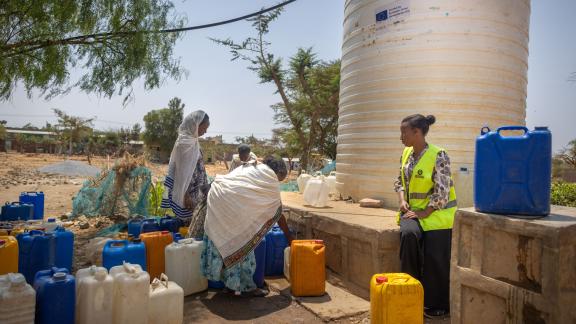
Despite these improvements, the water challenges persisted. “Although some progress, the water is still not enough to support everyone in this community, but we do what we can to ensure people have access to it water, so it is shared among all people”, Alem Gomera, PHE (Public Health Engineering) Assistant in Oxfam in Ethiopia said.
Birzaf's resilience is echoed across the camp, where Oxfam, with support from ECHO, continues its vital work. Hand-dug wells and latrine construction projects promise sustainable solutions, while hygiene education initiatives aim to instill lasting practices. Additionally, the provision of water treatment chemicals ensures the health benefits of clean water are maximized for the entire community.
In Tigra, Oxfam working with its partners has maintained 405 handpumps serving over 281,000 people. In Aby-Addi town, Oxfam has maintained, 30 hand pumps at water points, serving 9,000 people.
As she looks towards the future, Birzaf remains hopeful, "I was hopeful before, and I still am," she said. “My hope is to return to my home village."
